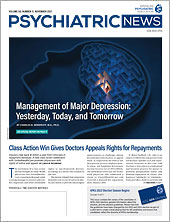Although lifelong learning has always been one of medicine’s central mantras, it has never seemed as pertinent or as easy to accomplish as it is today.
The rate of change with which new scientific information and innovative technological, biomedical, and psychosocial applications related to psychiatric practice continue to emerge is astounding and constantly accelerating. If anything, some changes have been pushed to hyperspeed by novel demands of the COVID-19 pandemic. At the same time, access to useful information has mushroomed.
Thankfully, after completing residency and fellowship training, few psychiatrists assume that they can put away their books and journals and simply cruise along on what they have already learned. In fact, most novice practitioners feel shaky and insecure about their competence and seek ways to continue to get advice, consultation, and reassurance.
By midcareer, however, practitioners may start to feel comfortably set in their ways, confident in what they’re doing. They may start to sense that journal articles and professional talks peppered with unintelligible PowerPoints aren’t all that helpful. Older practitioners might even feel tired and jaded—that efforts to keep up are beyond them and that they can simply keep doing what they’ve been doing for years and years. Clinicians who feel that they’ve seen it all, know enough, and can simply go through the same routines over and over can become bored and burned out. Some may be so burned out that “lifelong learning” becomes one more burden.
Clearly, getting too comfortable and set in one’s ways can sometimes be bad for patients and bad for practitioners. While “same old, same old” ways of practicing might result in optimum care for certain patients treated by expert clinicians, in other instances practicing by rote might result in patients’ receiving suboptimal care.
But, properly done, lifelong learning should feel like a fun quest, not a chore. It should help satisfy one’s perpetual curiosity itch. Lifelong learning should be an “I want to,” not a “should.” Lifelong learning should be personally meaningful to your professional activities, not performed as an obligation or prescribed by bureaucracies.
Happily, most psychiatrists are naturally curious. Day to day, such curiosity is most easily activated in practice settings. Regardless of your years of experience, just about every patient or administrative encounter should present challenges or evoke questions capable of stimulating “learning issues” suitable for “just-in-time learning.” These are topics you don’t know enough about but definitely want to know about before your next encounter with these individuals. The practical urgencies and demands of these issues fire up your attention to ease learning. By keeping a running list of your learning issues, you always have something important to look up during spare moments. What about all those technical terms you’ve heard about but really don’t understand?
Accessing resources to help answer these questions is simpler today than ever before. First, traditional methods apply. For quick answers to highly specific problems, clinicians usually reach out to respected and knowledgeable “go to” peers, mentors, and former teachers by email, telephone, or video. For more detailed information, they turn to standard, authoritative texts such as those from APA Publishing; APA’s practice guidelines; and online texts such as UpToDate, Medscape, or even Wikipedia. Increasingly, clinicians turn to Google Scholar and PubMed.
When clinicians belong to health care systems whose libraries subscribe to publishers’ bundled journal subscriptions, they can usually access full texts of the most current research and review articles. (If you or your institution don’t subscribe to PsychiatryOnline from APA Publishing, check it out
here.)
For ongoing education, clinicians can delve into the informative columns and articles published in Psychiatric News and other trade newspapers and newsletters. Even throwaway journals and the myriad psychiatrist-directed information offered by commercial education companies online contain useful information, although readers are cautioned to be on high alert for commercial spin and fake medical news where medications, devices, and other interventions are hyped and oversold. To prepare for recertification examinations and maintenance of certification requirements, clinicians often turn to APA’s FOCUS journal and its related programs.
Psychiatrists should also indulge in the pleasures afforded by deeper dives into the literature and emerging technologies. Thanks to COVID-19, learning to practice via telehealth has become almost mandatory. Reading entire books, watching TEDMed talks, listening to podcasts, and taking formal courses (live, hands-on, asynchronously online) take time. However, these activities not only provide intellectual satisfaction but also offer practice-building and other career-building skills.
Psychiatrists have jumped into executive and online M.B.A. and certificate programs designed to increase administrative, financial, political, research, and other skill sets. Numerous free, high-quality courses are available online for those wishing to refresh or update their knowledge of all aspects of neuroscience, genetics, genomics, psychology, and much more.
Finally, the “Zoomiverse” has opened up many other opportunities. We can effortlessly Zoom across boundaries of time and space and join our best friends and colleagues to develop accessible, socially meaningful, educationally rich get-togethers. We can create journal clubs, book clubs, teaching and peer-supervising conferences, collaborative scholarly projects, and all manner of (HIPAA compliant) professional activities. And all from the comfort of our own homes.
So, what would you like to do with the times you routinely set aside for your ongoing education—which you do, of course. Don’t you? ■

